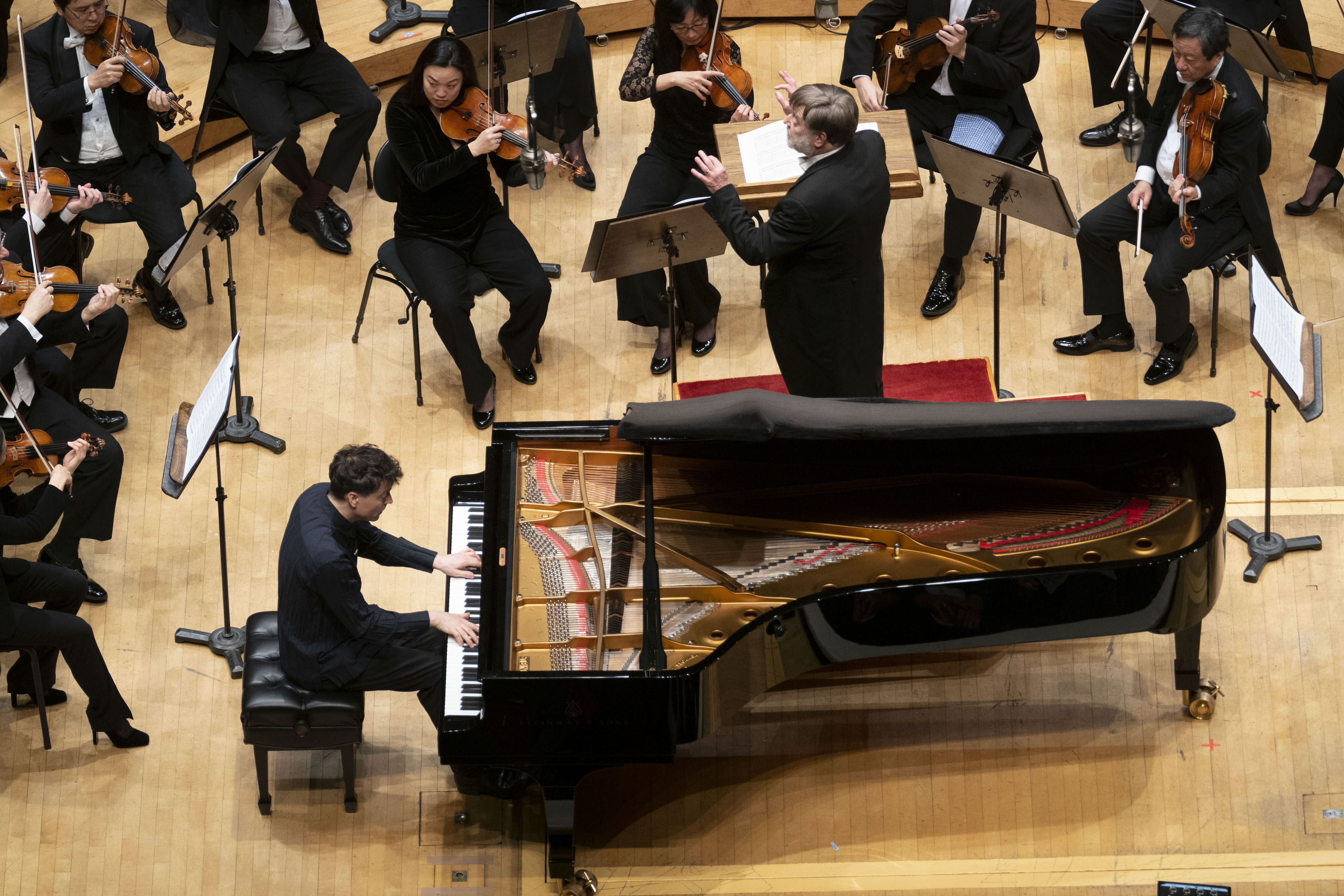A lethargic homecoming for Chicago Symphony

It was a sleepy Thursday evening when the Chicago Symphony Orchestra returned to Orchestra Hall for their first subscription concerts of 2020. Fresh off their most recent European tour with Riccardo Muti — marquee events of the Italian maestro’s decade of music directorship — an overall sense of jet lag prevailed under Lyric Opera music director Sir Andrew Davis’s baton. Empty seats abounded, principal players were scarce, and one couldn’t help but think the program’s double bill of Beethoven concertos was to spare the returning musicians much heavy lifting in their first outing back.
British pianist Paul Lewis was the solo protagonist for Beethoven First and Fourth Piano Concertos. Lewis is a sophisticated artist who deserves his international reputation, but his playing is often restrained; its subtleties tend to come off better in recital and chamber settings than in heftier concertante works.
The orchestra provided a workmanlike account of Beethoven’s expansive introduction to the First Concerto, and was minimally responsive to Davis’s indications. Perhaps there was some relief The Boss was no longer in charge? Lewis’s playing throughout the Allegro con brio was pristine and articulate, but there was little of the force and jaggedness even this “early” Beethoven work requires. There was also a near catastrophe in the cadenza when Davis cued to the orchestra too early at Lewis’s final cadential trill.
John Bruce Yeh’s eloquent clarinet solos were a highlight of the Largo (indeed the evening), and while Lewis was better in this more understated music, his long phrases lacked swoop or architecture. The concluding Rondo proceeded with little fire at what felt like a safe tempo, and even its gypsy-like minor episode was short on flair. (Martha Argerich’s sublime live recording with the Royal Concertgebouw Orchestra illustrates exactly what was missing Thursday night.)
The Fourth Concerto got off to an inauspicious start as a jangling cellphone obliterated whatever effect Lewis may have been trying to cultivate in Beethoven’s revolutionary opening bars for the solo keyboard. Lewis mined ethereal colors in the Allegro moderato’s quieter moments, though one wanted more of a clangorous sense of arrival when the piano declaims the movement’s idée fixe about halfway through. Beethoven’s dynamic cadenza also lacked fireworks.
Lewis’s reserved approach suited the central Andante con moto quite well, and he created poetry in the vulnerable piano writing, contrasting with the strings’ terse sentences. The closing Rondo saw the same lapidary playing from Lewis that typified the evening, but his polite approach elided Beethoven’s rough edges and created little bravura.
The first CSO performances of two works by British composer Sir Michael Tippet opened each half. Sir Davis said to the audience that he had been enamored with his countryman’s oeuvre since his teenage years, but CSO audiences have not been that much poorer for not having been introduced to the two works on Thursday’s program.
The evening opened with Tippett’s Little Music for String Orchestra of 1946. This ten-minute suite of four connected movements is finely crafted, but not in any memorable way. The emphatic opening gesture is attention-grabbing, but under Davis Tippet’s intricate contrapuntal writing felt wandering and wanting direction. Even Davis’s turning to the audience to wink as the music’s final bars evaporated could not make up for the general lack of charm.
Tippett’s 1962 Praeludium for Brass, Bells, and Percussion opened the second half. Davis commented that this short work “ends enigmatically,” but frankly its whole six minutes is puzzling. A “mosaic of sonorities” according to the composer, each section of the ensemble plays its own material more or less throughout, having apparently little to do with one another. A repeating descending motive in the horns provides something for listeners to hang onto, but otherwise the intended effect of this work remained obscure.
The program repeats 1:30 p.m. Friday, 8 p.m. Saturday and 7:30 p.m. Tuesday. cso.org; 312-294-3000.
Posted in Performances



Posted Feb 02, 2020 at 6:48 am by Bob Eisenberg
The Saturday evening performance featured an UNsleepy orchestra (in my opinion) although Paul Lewis seemed unwilling to phrase when he was showing off his formidable technique. A slightly out of tune piano after intermission did not help, but John Bruce Yeh did his magic once again in a Beethoven slow movement. The big question, however, is the change in reverberation time that I thought I heard sitting in the lower balcony right. Did anyone else notice the longer reverberation or was I just in too mellow a mood to hear objectively?